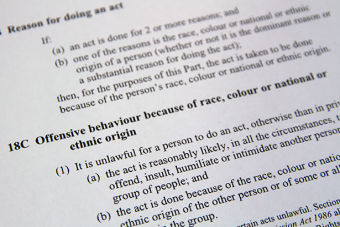IN THE MEDIA
It’s time to put the 18C debate to bed
March 6, 2017 | Colin Rubenstein

Colin Rubenstein
An edited version of this article appreared in the Sydney Morning Herald – 6 March 2017
Now that the Parliamentary Joint Committee Inquiry into Freedom of Speech has handed down its findings, it’s time to put the idea of making changes to Sections 18C or 18D of the Racial Discrimination Act (RDA) to bed.
The Committee found no consensus for making any changes to the wording of either clauses 18C or 18D, which have worked effectively for over 20 years, and merely noted some differing ideas that had been raised.
Changing either section is not just unnecessary but would be potentially damaging, despite the ideologically-driven campaign on the part of some to demand these clauses be abolished or diluted in the name of “freedom of speech.”
Maintaining Australia as a successful, largely harmonious, liberal democratic and multicultural society requires both preserving robust freedom of expression, and providing legal recourse to those victimised by racist harassment, intimidation and abuse. Clause 18C of the RDA has provided that recourse for those who have been the victims of acts that offend, insult, humiliate or intimidate on the grounds of race, while freedom of speech has always been strongly protected by the wide ranging exemptions under section 18D.
There is little reason to believe that free speech in Australia is not robust and well-protected nor that the balance provided by this legislation, which maximises the scope for free speech while still pursuing other public interest goals, has become skewed.
Freedom of speech, important as it is, is not an absolute right in any nation on earth, and the Australian Law Reform Commission has identified at least 9 different other sorts of Australian Commonwealth and State laws that limit, prohibit or render unlawful expression in many forms and contexts – including sedition, secrecy, advertising, media, defamation, intellectual property and perjury laws
Indeed, despite a tiny number of cases attracting controversy over the process of administering the complaints, 18C and 18D have worked effectively and as intended for over 20 years in thousands of cases. In fact, with the one exception of the 2011 case Eatock v Bolt, which saw prominent columnist Andrew Bolt ordered to withdraw two columns, no other finding under 18C has proven at all controversial. The two other examples generally offered by the ‘free speech warriors” – the QUT case and Leak case – in fact led to no finding that anyone had breached 18C, despite admitted problems with the process by which both these complaints were handled.
Sections 18C and 18D have formed a vital pillar of successful Australian multiculturalism, helping to maintain social harmony and minimise hatred and hostility between different groups.
Since the amendment of the Racial Discrimination Act 1975 in 1995 to include 18C and 18D, organisations monitoring racism have witnessed both more circumspection and less harm by openly racist groups in Australia. This has clearly benefitted the well-being of minority groups in Australian, including the Jewish community, as well as the social cohesion of Australian society as a whole.
Important precedents have been set against Holocaust denial and other manifestations of racism. For example, statistics maintained by the Jewish community’s central database show there was a substantial decline in incidents of anti-Jewish harassment in Tasmania and South Australia following judgements in Jones v Scully and Jones v Toben respectively, which were prosecuted under Section 18C.
Arguments by critics that the wording of 18C – and specifically the inclusion of the words “offend” and “insult” – creates a subjective “hurt feelings” test are simply wrong as a matter of law. For the fewer than 5% of cases that actually make it to court, the courts have always read these words together with “humiliate or intimidate” as one test implying “profound and serious effects, not… mere slights,” and applied the test to a normal, reasonable person of the claimant’s heritage. Mere feelings of offence or insult has never been sufficient to lead to a finding that the Section has been breached.
Moreover, this language is similar to that used across considerable existing state and federal legislation and the practice across many liberal democracies around the world.
The Committee did justifiably make some sensible recommendations for streamlining the complaint-handling process through the Australian Human Rights Commission, including improving its ability to quickly terminate complaints that are vexatious, without merit or have no legal chance of success. Hopefully, the government will implement all or most of them. It is interesting to note that even some critics of 18C have acknowledged that these measures would likely correct any problems that have arisen with implementation of the act – such as the Commission’s handling of the controversial QUT case.
The thorough, diligent work of this Inquiry, together with the sensible, limited administrative reforms it has recommended, should finally put to rest the often ideologically-driven and poorly-informed campaign by those seeking to abolish 18C. This should both help alleviate the divisions and anxieties this often heated debate has caused – particularly unwelcome at a time of increasing populist, xenophobic and extremist activity both in Australia and elsewhere – and hopefully, provide the basis for enhanced community consensus around the effective, equitable legislative and administrative arrangements proposed.
Dr Colin Rubenstein AM is the Executive Director of the Australia/Israel & Jewish Affairs Council (AIJAC), taught politics at Monash University for many years and was a member of the National Multicultural Advisory Council.
Tags: Australasia





